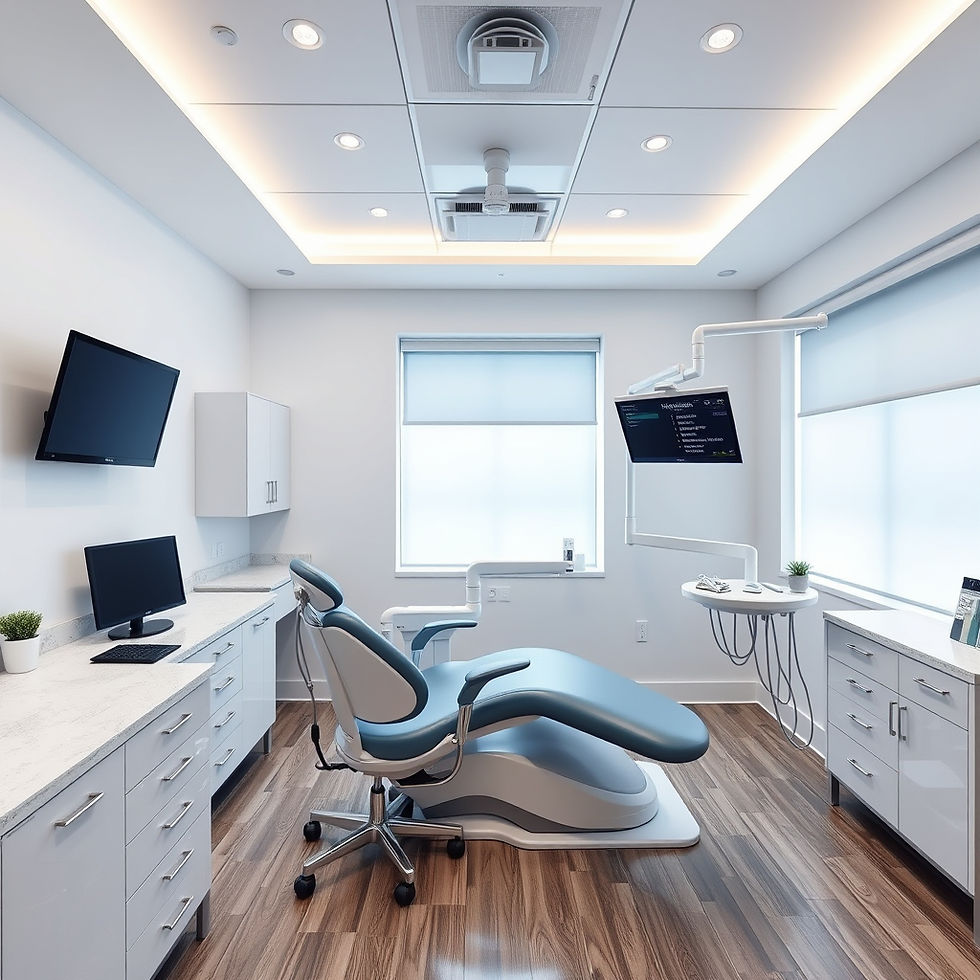The Importance of Adult Dental Check-ups: Maintaining Oral Health Beyond Childhood
- Tammy Conley, Registered Dental Assistant

- May 21, 2025
- 4 min read
Maintaining good oral health is essential for overall well-being. Regular dental check-ups play a critical role in achieving that goal. While childhood dental visits lay the foundation for a healthy mouth, adults often overlook these important appointments. By understanding the significance of adult dental check-ups, individuals can take proactive steps to prevent oral health issues and maintain a bright, healthy smile.
The Transition from Childhood to Adulthood
During childhood, regular dental visits are standard, a habit encouraged by parents and caregivers. These visits are crucial for monitoring dental development and addressing issues like tooth decay. However, as individuals transition to adulthood, they may think dental visits are not as necessary.
This perception is misleading. Dental issues often persist or escalate in adulthood. Factors such as lifestyle choices, dietary habits, and overall health changes can significantly affect oral health. For example, statistics show that adults aged 20-64 experience about 1.5 cavities per person, indicating that dental problems continue into adulthood. Thus, routine check-ups are vital for effective oral health management.
The Benefits of Regular Dental Check-ups
Early Detection of Oral Health Issues
One major benefit of regular dental check-ups is the early detection of potential problems. Dentists are trained to identify early signs of cavities, gum disease, and oral cancer. For instance, research indicates that early-stage gum disease can affect over 50% of adults, but with regular check-ups, treatment can be much simpler, less invasive, and more effective.

Preventative Care and Guidance
Dental check-ups also allow for preventative care. Dentists and hygienists clean teeth and provide tailored advice on maintaining good oral hygiene between visits. They might recommend specific toothpaste or suggest methods to improve brushing techniques. This proactive approach can save patients from larger health concerns and costly treatments later on.
According to studies, individuals who regularly visit the dentist are 40% less likely to develop significant oral problems compared to those who do not.
Comprehensive Oral Health Assessment
During appointments, dentists perform thorough examinations to assess the overall health of your mouth. They check for signs of gingivitis, loose teeth, and wear on dental crowns or fillings. Each person’s oral health is unique, and regular evaluations help create personalized care plans tailored to specific needs.
The Impact of Lifestyle Choices on Oral Health
Adults often make lifestyle choices that significantly impact oral health. Factors such as smoking, high sugar diets, and poor oral hygiene habits contribute to dental issues.
The Role of Diet and Nutrition
Diet is crucial for oral health. Consuming sugary foods and drinks regularly can lead to cavities. For example, a study found that adults who consume soda five or more times a week are 60% more likely to develop cavities compared to those who don't. Conversely, a diet rich in fruits, vegetables, and whole grains strengthens gums and teeth. During dental visits, professionals can offer dietary advice to promote better oral health.
Effect of Tobacco and Alcohol
Both tobacco use and heavy alcohol consumption can lead to severe oral health problems, including gum disease and oral cancer. Research shows that smokers are twice as likely to develop gum disease compared to non-smokers. Dentists often provide support and referrals to programs designed to help individuals quit smoking or reduce alcohol intake.
The Link Between Oral Health and Overall Health
Research increasingly shows that oral health is closely connected to overall health. Poor oral hygiene can exacerbate conditions like diabetes and heart disease. Regular dental visits enable dentists to identify potential issues and collaborate with other healthcare providers to ensure a comprehensive approach to health management.
Addressing Chronic Health Conditions
For adults living with chronic conditions, maintaining oral health is even more critical. For instance, studies indicate that diabetics are 2-3 times more likely to develop gum disease. Dentists can work with medical professionals to create integrated care plans that address both dental and overall health needs.
Overcoming Barriers to Dental Visits
Despite the clear benefits of regular dental check-ups, many adults avoid them due to various barriers, including financial concerns and fear of the dentist.
Financial Accessibility
Insurance plans often cover routine dental check-ups, yet many individuals are unaware of their benefits. Knowing what is covered can ease financial stress associated with dental care. Additionally, many dental offices offer payment plans or financing options, making care more accessible.
Addressing Dental Anxiety
Dental anxiety is common and can prevent individuals from seeking necessary care. Dentists are increasingly aware of this issue and often provide options to help patients feel more comfortable, such as laughing gas or sedation dentistry and creating a calm, welcoming environment.
Embrace Your Oral Health Journey
Adult dental check-ups are essential for maintaining long-term oral health. They enable early detection of problems, provide preventative care, allow for comprehensive assessments, and highlight the connection between oral and overall health.
By prioritizing routine dental visits, adults can proactively ensure a healthy smile and prevent potential health issues. Good oral health habits do not end with childhood; it is a lifelong journey that requires commitment and regular attention.
Take Action Today
Scheduling a dental check-up can be an empowering step towards better health. Don’t wait for a problem to arise—book your visit today and take charge of your oral health!



Comments